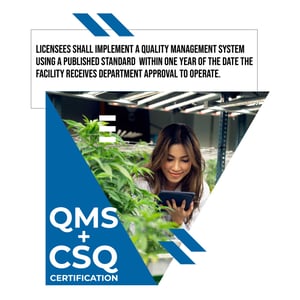Missouri QMS for Cannabis
Licensees shall implement a quality management system using a published standard, such as those offered by Cannabis Safety and Quality within one year of the date the facility receives department approval to operate. The chosen standard shall be applicable to the licensee’s facility type and be implemented with emphasis on regulatory compliance.

MISSOURI QMS FOR CANNABIS
19 CSR 100-1.100(4)(C)
Licensees shall implement a quality management system using a published standard, within one year of the date the facility receives department approval to operate.
HERE'S A BREAKDOWN:
When it comes to cannabis QMS (Quality Management Systems) in Missouri, there are some specific requirements and considerations to keep in mind.
MISSOURI CANNABIS QMS REQUIREMENTS:
MANDATORY IMPLEMENTATION: As of August 1st, 2023, all cannabis businesses in Missouri, including cultivators, processors, dispensaries, and testing labs, are required to implement a QMS based on a published standards.
COMPLIANCE FOCUS: The QMS should be designed to ensure compliance with Missouri's Emergency and Proposed Rules for Medical and Adult Use Cannabis, covering aspects like cultivation, processing, testing, packaging, labeling, and distribution.
WHAT IS A QUALITY MANAGEMENT SYSTEM?
QMS stands for Quality Management System. It refers to a set of policies, processes, procedures, and resources that an organization implements to ensure that its products or services consistently meet or exceed customer expectations.
A well-implemented QMS helps organizations improve efficiency, reduce waste, minimize errors, meet regulatory requirements, enhance customer satisfaction, and foster a culture of continuous improvement.
QMS frameworks can vary based on industry standards, specific organizational needs, and compliance requirements.

CANNABIS INDUSTRY
Key components of a QMS in the cannabis industry may include:
Managing all documentation related to product specifications, test results, and compliance records.
GMP COMPLIANCE: COVERS QMS
GMP guidelines establish a structured framework that ensures products meet the necessary safety, quality, and efficacy requirements for their intended use. This comprehensive system emphasizes stringent quality control measures throughout the manufacturing process, encompassing rigorous testing, documentation, and adherence to defined procedures. It mandates the training and qualification of personnel, maintaining adequate facilities and equipment, and implementing robust sanitation practices to prevent contamination and uphold product integrity. Compliance with GMP necessitates stringent monitoring and testing of raw materials as well as the final product, along with thorough validation and documentation of manufacturing processes to guarantee reliability and consistency in quality.
Adherence to GMP principles is mandatory across various industries such as pharmaceuticals, food production, cosmetics, and cannabis cultivation to ensure consumer safety and product reliability. The guidelines emphasize continuous improvement initiatives and staying updated with evolving regulatory standards. By implementing and strictly following GMP guidelines, companies can mitigate risks, maintain product quality, enhance consumer confidence, and contribute to the establishment of reliable and safe products in the market, thus underscoring the significance of GMP as an integral part of an effective Quality Management System.
MISSOURI LAW
TO GMP AUDIT SUCCESS FOR MISSOURI'S QMS COMPLIANCE
ASI can significantly aid a cannabis company in navigating and successfully passing a Good Manufacturing Practices (GMP) audit, particularly concerning Quality Management System (QMS) requirements specific to Missouri.
ASIs specialize in assessing compliance with established standards, providing expertise and guidance essential for ensuring adherence to state regulations.
ASIs offer tailored consultations, evaluating existing processes, documentation, and operational protocols, identifying areas for improvement to meet or exceed GMP standards.
Through collaborative efforts, an ASI assists in refining the QMS, implementing necessary changes, and preparing the cannabis company comprehensively for the GMP audit, ensuring alignment with Missouri's stringent requirements and enhancing the likelihood of successful compliance.
